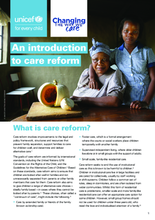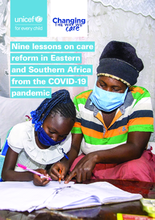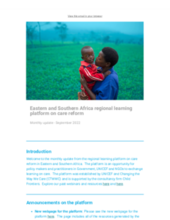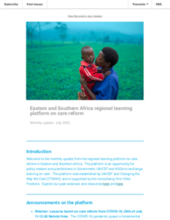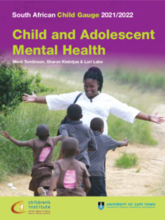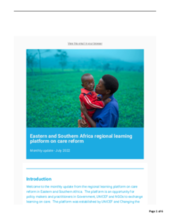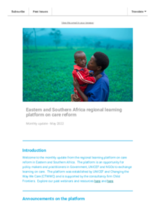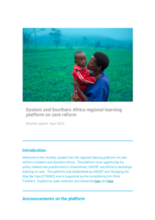childrens_living_arrangement
children_living_without_bio
Displaying 41 - 50 of 334
Although care reform is well established in some parts of the Eastern and Southern Africa, many countries in the region are just beginning their care reform journey. This short paper is aimed at these contexts. It explains what care reform is, the different components of care reform, why care reform is important and how to start a care reform process.
Key lessons learnt on how to carry out effective care reform in Eastern and Southern Africa from the COVID 19 pandemic.
This is the monthly update of the Eastern and Southern Africa Regional Learning Platform published in September 2022.
This is the monthly update of the Eastern and Southern Africa Regional Learning Platform published in July 2022.
The rights of immigrant and undocumented women and children to access free healthcare in South Africa will be put to the test in a court challenge launched by SECTION27 in the Gauteng High Court in Johannesburg.
This sixteenth issue of the South African Child Gauge focuses attention on child and adolescent mental health and how early experiences of adversity ripple out across the life course and generations at great cost to individuals and society. It calls on South African society to put children at the centre of all policies in order to protect children from harm, build their capacity to cope with stress and adversity, and provide them with opportunities to thrive.
This is the monthly update of the Eastern and Southern Africa Regional Learning Platform published in June 2022.
This is the first monthly update of the Eastern and Southern Africa Regional Learning Platform published in May 2022.
Safety parents – charged with the temporary care of children in emergency cases – have called on the government for much-needed financial support. The Department of Social Development said as many as 1 300 children had been placed in the care of safety parents in the province.
This is the second monthly update of the Eastern and Southern Africa Regional Learning Platform published in April 2022.

